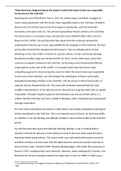“Historians have disagreed about the extent to which the Soviet Union was responsible
for the start of the Cold War”
Following the end of World War Two in 1945, the United States and Britain struggled to
reach mutual agreement with the Soviet Union regarding mastery over Germany. Relations
between the US and the Soviet Union thus began to deteriorate, and it dramatically
worsened as the years went on. This period of geopolitical tension, known as the Cold War,
has forever been a contentious issue; scholars have since debated which side is more to
blame for this conflict. Cox and Kennedy-Pipe argue from the revisionist perspective,
outlining that America carry more responsibility for the instigation of the Cold War, for their
provocative Marshall Plan antagonised the Russians. From an orthodox point of view,
Schlesinger notes that USSR is to blame to a greater extent, as their communist ideology
elucidated a hostile image and threatened the US. Jervis, on the other hand, views both
countries as equally to blame for the Cold War, by focusing on the fundamental different
social systems as the root of the conflict. To evaluate which historian has the most
compelling argument in determining the extent to which the Soviet Union was responsible
for the start of the Cold War, one will consider the contribution of Stalin’s personality
alongside his ideological beliefs to the Cold War, and the extent to which Soviet policy of
national security threatened the US. This essay will eventually conclude that the most
credible interpretation is of the historian Jervis, whereby he recognizes both sides as equally
responsible. Through in-depth analysis of the behaviour and actions of both states, it is
evident that the Cold War was more a battle of ideology, which could have been suppressed
through cooperation.
The first criteria will debate the extent to which Stalin’s personality alongside his ideological
beliefs contributed to the Cold War. This is an essential issue to discuss, for historians differ
on whether or not the ideology and attitude of Stalin is what incited conflict in the Cold War
period.
Cox and Kennedy-Pipe argue that although ideology did play a role in shaping Stalin’s
outlook, it should not distract us from looking at some of the more basic material factors
that determined Soviet actions.1 The Soviet Union was confronted with massive economic
problems at home, and was faced with the highly dynamic American economy that was at
least six times larger.2 Despite USSR’s financial disadvantages, USA ended the Lend-lease to
Russia in 1945, creating tension and animosity. However, when analysing this US policy, one
finds that the US were already hesitant to provide sales or loans to USSR, for Stalin was a
1
Cox and Kennedy-Pipe The tragedy of American diplomacy? Rethinking the Marshall Plan 2005 p.107
2
Ibid.





